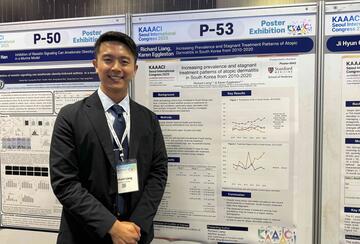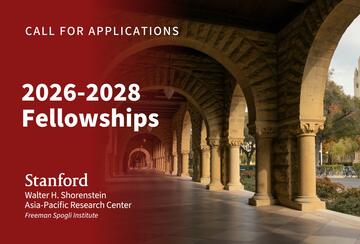APARC Asia Health Policy Program at APARC - News

Spanning medicine, public health, and East Asian studies, Richard Liang’s rare academic path at Stanford has fueled collaborations that bridge research and policy across borders and disciplines.

The center offers multiple fellowships in Asian studies to begin in fall quarter 2026. These include a postdoctoral fellowship on political, economic, or social change in the Asia-Pacific region, postdoctoral fellowships focused on Asia health policy and contemporary Japan, postdoctoral fellowships and visiting fellow positions with the Stanford Next Asia Policy Lab, and a visiting fellow position on contemporary Taiwan.

Despite rising health care spending, adults in South Korea’s lowest-income quintile experience the smallest relative improvement in life expectancy and well-being, according to a new study. The co-authors, including Stanford health economist Karen Eggleston, call for the country’s health policy to prioritize both equity and value, and highlight lessons for other health systems.

New research by a team including Stanford health economist Karen Eggleston provides evidence about the positive impact of China’s urban-rural health insurance integration on mental well-being among rural seniors, offering insights for policymakers worldwide.

A comprehensive review of rapidly aging South Korea’s efforts to mitigate the social and economic costs of Alzheimer’s disease and related dementias, co-authored by Stanford health economist Karen Eggleston, provides insights for nations facing policy pressures of the demographic transition.

Despite the nation’s rapidly aging demographics, South Korea's economy has not adapted as well as the United States, a new study finds. The researchers, including Stanford health economist and director of the Asia Health Policy Program at APARC Karen Eggleston, show that age-friendly jobs attract a broad range of workers and that structural barriers in the labor market influence which groups can access these roles.
The Center’s new cohort of seven scholars pursues research spanning diverse topics across contemporary Asian studies.

As Asian economies grapple with aging populations, rising healthcare demands, and rapid technological change, APARC’s 2024-25 Asia Health Policy Program Postdoctoral Fellows Mai Nguyen and Jinseok Kim study large-scale health care structural and policy challenges from the lens of individual decision-making.

Economist Huixia Wang, a visiting scholar at APARC, discusses her research into healthcare economics and the reverberating effects of poor healthcare access on health outcomes across generations.

In a new paper, a research team including Stanford health economist Karen Eggleston discusses the challenges and opportunities digital health technologies present in South and Southeast Asia, sharing evidence-based recommendations for shaping effective digital health strategies in low- and middle-income countries.

Held at Stanford and hosted by the Shorenstein Asia-Pacific Research Center, the third annual Dialogue convened global leaders, academics, industry experts, and emerging experts to share best practices for advancing Sustainable Development Goal 9 in support of economic growth and human well-being.

Held at Stanford University on October 10-11, 2024, the third annual Trans-Pacific Sustainability Dialogue will unite social science researchers, scientists, policymakers, and emerging leaders from Stanford University and the Asia-Pacific region to accelerate resilient infrastructure, promote inclusive and sustainable industrialization, and foster innovation.

Stanford’s Asia-Pacific Research Center Invites Applications for Fall 2025 Asia Studies Fellowships
The Center offers multiple fellowships for Asia researchers to begin in Autumn quarter 2025. These include postdoctoral fellowships on Asia-focused health policy, contemporary Japan, and the Asia-Pacific region, postdoctoral fellowships and visiting scholar positions with the Stanford Next Asia Policy Lab, a visiting scholar position on contemporary Taiwan, and fellowships for experts on Southeast Asia.
Researchers including Stanford health economist Karen Eggleston, the director of the Asia Health Policy Program at APARC, find that China’s urban-rural integration policy for social health insurance significantly improved the life satisfaction of rural residents, especially among elderly people and lower-income residents.
The Center’s new cohort of nine scholars pursues research spanning diverse topics across contemporary Asia studies.

Shorenstein APARC continued its APEC seminar series with the second installment, Asia-Pacific Digital Health Innovation: Technology, Trust, and the Role of APEC, a panel discussion that focused on how India’s digital health strategy has evolved and its lessons for other countries creating their own.

A new study, co-authored by Asia Health Policy Director Karen Eggleston, investigated preferences for telemedicine services for chronic disease care in South Korea during the COVID-19 pandemic and found that preferences differed according to patient demographics.
Asia Health Policy Program Director Karen Eggleston has coauthored the new third edition of Victor Fuch's 'Who Shall Live: Health, Economics, and Social Choice,' an authoritative book considering the great health challenges of our time.

The second annual convening of the Trans-Pacific Sustainability Dialogue will gather social science researchers and scientists from Stanford University and across the Asia-Pacific region alongside young leaders, policymakers, and practitioners, to expedite energy security solutions, investment, and policy support. Held in Seoul, Republic of Korea, on September 12-14, 2023, the dialogue features award-winning actor and director Cha In-pyo as honorary ambassador.

The Center offers a suite of fellowships for Asia researchers to begin in fall quarter 2024. These include postdoctoral fellowships on Asia-focused health policy, contemporary Japan, and the Asia-Pacific region, postdoctoral fellowships and visiting scholar positions with the Stanford Next Asia Policy Lab, and fellowships for experts on Southeast Asia.

In this interview, Asia Health Policy Postdoctoral Fellow Jianan Yang discusses her research into the economics of patient behavior and the pharmaceutical industry in developing countries.
A new study by researchers including APARC's Asia Health Policy Postdoctoral Fellow Dr. Jianan Yang reveals that text messages providing information on the harmful social impacts of antibiotic resistance help reduce antibiotics purchase, identifying a cost-effective means of addressing the risks of antibiotics misuse and overuse.
In the third installment of a series recognizing the 40th anniversary of Stanford’s Walter H. Shorenstein Asia-Pacific Research Center, the Asia Health Policy Program gathered alumni to reflect on their time at APARC and offer their assessments of some of the largest challenges facing healthcare practitioners.

Research by Stanford health economist Karen Eggleston, the director of APARC's Asia Health Policy Program, offers evidence on the link between medical spending and health outcomes in South Korea, showing how the country can benefit from developing a “satellite account for health” to promote high-value innovations for longer, healthier lives.

New Study Shows Health and Economic Benefits of Controlling Diabetes Risk Factors in Chinese Adults
Using recent data from the China Chronic Disease and Nutrition Surveillance survey and applying the Chinese Hong Kong Integrated Modelling and Evaluation microsimulation model, a new study co-authored by APARC's Karen Eggleston found that substantial health improvements and medical savings could be achieved in China by better control of glycemia and blood pressure, two modifiable risk factors for diabetes.







